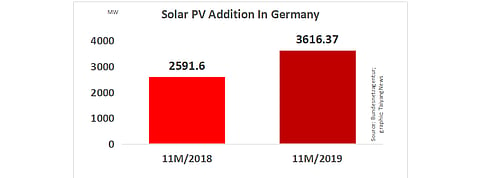

New solar PV installations in Germany during the month of November 2019 were reported by the Federal Network Agency (Bundesnetzagentur) as reaching 270.54 MW, declining over 28% sequentially as October 2019 deployments added up to over 377 MW (see Germany Installed 377.6 MW Solar In Oct 2019). But it grew over 20% from previous year's numbers when PV capacity addition was 223.6 MW as per numbers shared back then (see Germany Added Over 223 MW PV In Nov 2018).
The November 2019 numbers reflect 226.28 MW of new PV installed outside the tender scheme. Another 24 MW came from tender-based ground mounted solar farms.
With this, in the first 11 months of 2019, Germany has added 3.616 GW of PV capacity compared to 2.59 GW installed during the same time last year, making it the second consecutive year when the country has not only met but exceeded its original annual target of 2.5 GW. SolarPower Europe in its first EU Market Outlook forecasted the German solar PV market to install 4 GW in 2019 (see EU PV Demand Up 104% In 2019).
On a cumulative basis, the country's solar PV capacity reached 49.53 GW till the end of November 2019, according to the agency.
Germany's government has officially adopted its Climate Protection Act 2030 and allotted 98 GW capacity to be achieved in the solar space by the target year, but there is no clarity as yet about the adjustment of subsidies provided by the state to the volume under the previous cap of 52 GW that was removed under the act (see Germany Approves Climate Protection Act 2030).
BSW Solar, the German solar association, has warned the country of a possible power generation gap due to the planned phase out of nuclear and coal power plants and called for 'rapid dismantling of market barriers' in 2020 to allow for solar PV to flourish since it comes with lower costs and enjoys very high acceptability among general population.
"The abolition of the solar cap must be completed in January," said Carsten Körnig, managing director of BSW Solar. "In 2020, the solar energy expansion goals must finally be adapted to the climate targets and market barriers such as the financial burden on solar self-consunnption and neighborhood supplies (community solar) must finally be abolished." BSW asks for annual PV additions of at least 10 GW to deal with the phase out.
